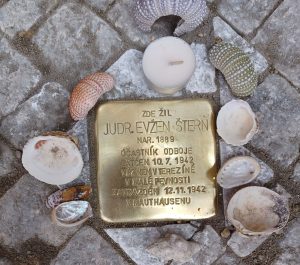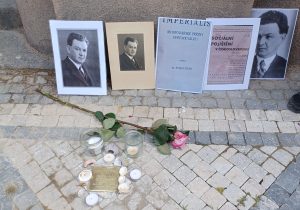 Address: U SPARTY 14, PRAGUE 7
Address: U SPARTY 14, PRAGUE 7
Born 07. 05. 1889 Čelákovice
IMPRISONED IN TEREZÍN IN THE SMALL FORTRESS
Murdered 12. 11. 1942 Mauthausen
Evžen Štern was a Czechoslovak patriot and one of the founders of Czechoslovak social legislation. He was born in 1889 in Čelákovice, and as a high school classmate and friend of Karel Čapek, he was a member of president Masaryk’s so called Friday meetings. His wife, Růžena, was a high school professor of Czech language and also a translator from French, and they had two children. They lived in Prague’s Letná, from where Evžen used to go watching football and supported Sparta football club. Apart from football, Evžen liked to travel and go to nature. Politically, he held humanist and left-wing political opinions and was a member of the Social Democracy. He is the author of the Eight-Hour Working Time Act and the Act on Paid Vacation leave, the wording of which was used until the end of the 1960s and which at that time made Czechoslovakia one of the countries with the most advanced social legislation. In the years 1921–1926, he was the representative of Czechoslovakia in the International Labor Office in Geneva, and after his return he founded the Central Social Insurance Agency in Prague (today’s Czech Social Security Administration, ČSSZ).
The efforts he devoted to the improvement of Czechoslovak society remained unappreciated, because with the arrival of the German occupation he was prosecuted for his Jewish origin. Nevertheless, he decided to join the Czech resistance and became a member of the We Shall Remain Faithful Petition Committee. In July 1942, however, he was denounced by Czech flagmakers. He was arrested, taken to Terezin Small Fortress and then to Mauthausen concentration camp, where he was murdered on November 12, 1942. Evžen Štern defined himself as a socialist, but he was not exclusively on the side of either the proletariat or the bourgeoisie. He believed in a society formed by the middle class – “so that the excessively centrifugal exceptions down and up disappear”. In his reflections, he placed both cultural maturity and social justice on the same level.
